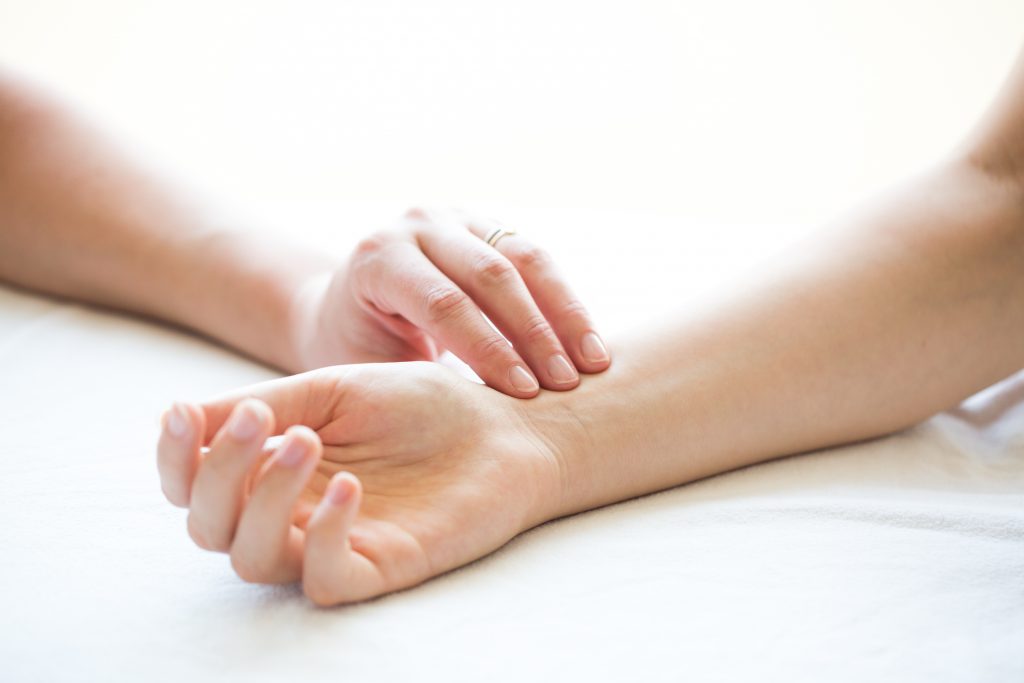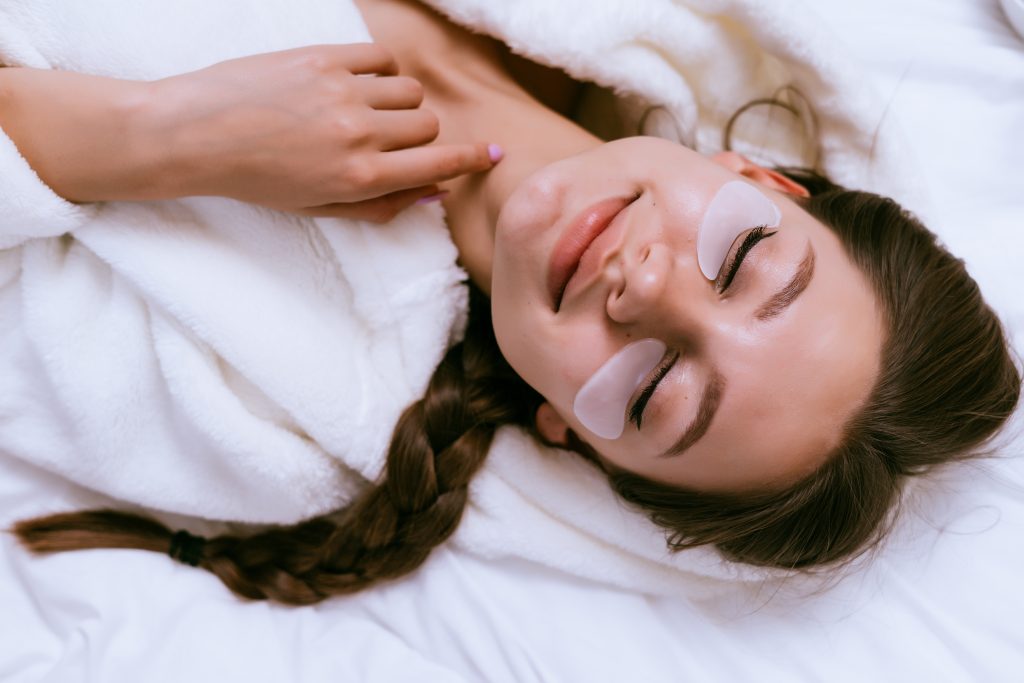Top 5 Reasons For Female Hair Loss
November 9, 2019 By Sarah WhiteNo Comments

It’s shedding season, ladies. While a little hair loss can be normal this time of year (we are animals after all, and all mammals do go through a yearly ‘shed’) this month way too many of my lady patients have been experiencing extreme amounts of hair loss. Losing large clumps of hair in the shower can be traumatizing and incredibly stressful, especially in a society where long thick hair is associated with beauty and health. Specialists agree that an average loss of 50 – 100 strands daily is perfectly normal. However, if you’ve noticed handfuls of hair lingering in your hair brush, or have seen a significant jump in the amount of hair coming out in the shower over the past few months then it’s time to check in with your Naturopathic doctor to determine the root cause. To get you started; here are the top 5 reasons that your hair is falling out, along with a few key blood tests that may help you determine the best way to keep those strands on your head.
You Have ‘Weak’ Blood
There are two ways to think about this concept. Firstly, iron is an important component of your blood; it’s job is to carry oxygen molecules around your body and adequate iron levels improve the flow of blood and nutrients to places like your scalp. When iron levels are low your circulatory system suffers, leading to low energy, cold hands & feet and significant hair loss. This is one of the most common reasons for female hair loss and should be ruled out asap to stop further shedding. In order to determine iron levels your doctor will need to order a ferritin blood test. This test shows us your level of an iron storage protein, which is your most important marker of overall iron status. Unfortunately, the current reference range for ferritin is wildly inappropriate. If you fall anywhere in the reference range of 5 – 275 units you’re considered ‘okay’. I’ve seen hundreds of patients with a ferritin of 5 – 10 that we’re told by their medical doctors that their iron levels were just fine; an assessment that blatantly ignores the evidence which tells us that a ferritin of >70 is ideal for hair growth. If you’ve been diagnosed with low iron I recommend trying my favourite ‘anemic lunch’, my go-to iron-rich salad recipe to help raise those ferritin levels.

We can also look at your blood health from a more holistic perspective. In Traditional Chinese Medicine theory ‘blood deficiency’ is an important cause of hair loss since hair is seen as an extension of your blood. If you consistently notice more hair loss in the fall then I recommend visiting your Naturopath for seasonal acupuncture; there are acupuncture points that can help build blood and keep hair on your head. If you’re not into the idea of needles (they don’t hurt, I promise) the following ‘blood-building’ dietary tips can be helpful:
- Eat lots of cooked vegetables: eating cooked foods is already a good idea this time of year when temperatures are dropping, but is especially important if you are experiencing hair loss. In TCM, your best health comes when you’re in-tune with your environment. This means eating warm, spicy and cooked foods in the fall and winter, and keeping light, raw foods for the spring and summer months.
- Eat the rainbow: orange, yellow, red and dark green foods are all indicated when you’re trying to build-up blood. The top seasonally appropriate sources include peppers, dark leaky greens, radishes, squash, pumpkin, spirulina and broccoli.
- Increase your intake of organic, grass-fed meat: organic grass fed meat (especially beef) is rich in iron, vitamin B12 and protein – all of which are important for blood and hair health. Aduki beans are a good vegan source of some of these nutrients and are encouraged on a blood-building dietary protocol.
- Eat beets: Beets are traditionally prescribed as a blood-building food to improve iron and oxygen status in your red blood cells. The high nitrate content of beets helps your body produce more nitric oxide (NO), which dilates your blood vessels allowing for more nutrient-rich blood to be delivered to your scalp. Beets are also rich in a nutrient called resveratrol, a hair-loving antioxidant. Studies show that resveratrol increases the lifespan of the hair follicle and can help suppress a hormone called PDG2, which is linked to inhibited levels of hair growth. Beets can be juiced and added to smoothies, roasted and tossed onto a salad or even snuck into baked goods and pancakes – like in my favourite special occasion breakfast: pink crepes.
You’re Stressed!
Fall is, without a doubt, a stressful time of the year. Between looming end of the year deadlines, back to school burdens, and the end of the more relaxed pace of summer it’s a common period of burnout for many busy women. The temperature transition from hot to cold in the fall is hard enough on the physical body (research shows that more people get sick this time of year than any other), then add in stress from increased demands in your day-to-day life and it’s a recipe for disaster when it comes to your adrenal glands.
Stress is inevitable. It gives us energy and provides stamina in emergency situations, it is motivating and stimulating and helps us to keep up with our busy lives. While short-term stress is unavoidable, stress is problematic when it becomes a constant and common occurrence. If you search stress + cortisol in pubmed (your free online resource to access studies) you will find hundreds of articles describing how stress negatively impacts the immune system, digestion, mental health, sleep patterns, skin health and hair loss (!!).
The fall season is a stressful time for many of us so it’s an excellent time to start building healthy stress-reduction habits and to begin a targeted supplement protocol to prevent stress-induced hair loss through the cooler months. Feeling like stress may be sabotaging your hair health? Here are my top lifestyle adjustments that can help keep your hair in the cooler months:
- Exercise in moderation: skip the high intensity stuff this time of year and opt for yoga, pilates, walking or swimming. High intensity training can increase cortisol levels while these low intensity activities lower stress hormone levels.
- Reduce caffeine and alcohol consumption: I’ve noticed a distinct pattern in both my patients and myself of adding an extra cup of coffee in the morning, or a nightly glass of wine in periods of higher stress. While this may help with both energy & relaxation in the short term, both alcohol and caffeine can actually be putting more stress on your already overworked adrenal glands, causing you to crash even harder come winter. Replace that extra cup of coffee with matcha, green tea or greens powders. Instead of drinking wine in the evening to unwind try meditation, or my favourite: a big glass wine glass filled with bubbly water + a few droppers-full of relaxing herbal tinctures. If you’re still going to drink coffee and alcohol I encourage you to try my relaxing lavender latte or honey-based cocktail for drink options that will have less of a negative impact on cortisol & blood sugar levels.
- Visit your Naturopathic doctor for a customized supplement prescription to support your adrenal glands during times of stress. Adaptogens are herbs that help the body adapt to stress, meaning that they can either lower or raise cortisol levels depending on which herb you take. It’s important not to self-prescribe adaptogenic herbs, if you’re someone with either chronically low or excessively high cortisol levels many common adaptogens can leave you feeling a lot worse. If you’re interested in taking a supplement to support your stress please visit your Naturopath to help you determine what your cortisol curve looks and to support your stress hormone output safely and effectively.
- Start a mindfulness practice: while this can look different to everyone, it’s essential when it comes to long term stress management. Some of my favourite mindfulness habits include journalling with my 5 minute journal, guided meditation with the headspace app, or daily walks in nature.

Vitamin D Levels Are Dropping
The body naturally produces vitamin D in response to sun exposure and unfortunately, fall simply brings less daily sun exposure. This drastic drop in vitamin D can have unwanted side effects, especially when it comes to your hair follicles. Despite being called a ‘vitamin’, vitamin D is actually a hormone and it plays an important role in energy production, immune support, mood regulation and hair loss. Statistics estimate that over a billion people across the world are either deficient in vitamin D or have insufficient levels. Almost 100% of patients that I test in office have a deficiency in this important vitamin, which is important when you consider the fact that levels will be dropping even lower along with shorter days and cooler weather. Research shows that a lack of vitamin D can cause to hair loss since vitamin D stimulates hair follicles to produce healthy strands. Vitamin D deficiency has been definitively linked to alopecia, the autoimmune condition that causes bald patches on the scalp and other areas of the body.
I personally take 4,000IU of a fat-soluble form daily in the fall and winter to maintain my levels around 125nmol/L. This is what functional medicine considers the ‘ideal’ level based on studies looking at cancer surveillance, hair health and longevity. I highly recommend working with your doctor to identify, based on testing and your health story, what daily dose of vitamin D is best for you. Vitamin D in any dose over 1,000IU is considered a drug, and should only be prescribed and administered by a ND, MD or NP in Ontario. If you live in the GTA and would like to work with me to develop your own personalized hair-health supplement protocol you can book online here.

You Have Gut Problems
New research indicates that, when it comes to hair hair, it’s actually critical to take a look at what’s going on inside of your digestive system. Your hair follicles spend most of their time in the growing phase, or anagen phase. After 3 – 5 years in anagen hair follicles move into the catagen (aka transitional phase) in which growth slows, eventually leading to the telogen phase when your follicle stops producing hair and that particular strand falls out. If your nutrition, gut and hormones are all on track your follicle will resume it’s anagen phase, producing a new strand of hair. The gut is especially important in this process since a healthy microbiome is critical for absorption of nutrients like protein, collagen and iron that are needed for continuous hair cycles. We also see a link between the types of good bacteria in your digestive system and how healthy your hair is. One mouse study showed that supplementation with a healthy bacteria called Lactobacillus reuteri increased anagen phase length (also know as that time hair actually stays on your head!) by 106%.
Hair loss combined with low energy and digestive issues may also be a sign of ‘leaky gut’. Stress, medications and poor food choices can all impact the lining of your digestive tract leading to increased gut permeability (aka leaky gut). When your digestive system is inflamed the space between the cells of your gut lining opens up. This allows larger protein molecules to get into the bloodstream where an immunologic reaction can take place. When food proteins and toxins are able to pass through your gut lining and into your bloodstream it leads to systemic inflammation along with possible skin and hair problems. These gut toxins, known as lipopolysaccharides, have actually been shown to attach to your hair follicles and turn off the anagen phase (aka growth phase) of your hair. If you’ve been experiencing significant hair loss along with digestive symptoms I recommend visiting your doctor for something called a urea test. This breath test will help you determine whether or not you have an h. pylori gut infection. When your stomach hosts high amounts these ‘bad’ bacteria have been shown to migrate out of the gut and actually block hair follicle receptors, leading to diffuse hair loss.

You’re Deficient In Key Nutrients
It’s no surprise that your hair needs a variety of nutrients to encourage it’s growth and overall health. Beyond iron & vitamin D, there are a few additional evidence-based nutritional deficiencies that are linked to hair loss. If factors like gut health, stress, and hormones have all been address it’s important to consider dietary intake of the following healthy-hair nutrients:
- Collagen: collagen is especially rich in an amino acid called proline, which makes up keratin; the main component your hair follicle. According to researchers collagen supplementation has been shown to support and increase your hair-building proteins, which can help prevent hair loss, and even encourage new hair growth. Several studies have also demonstrated that collagen (especially marine collagen) has powerful antioxidant activity and can protect susceptible hair follicles from oxidative damage.
- Vitamin C: antioxidants, like vitamin C, help prevent free radical damage in the hair follicles. Vitamin C also increases dietary iron absorption (scroll back up to the ‘weak blood’ section if you’re still not sure why that’s important). Since your body’s defence against free radicals decreases with aging and stress, busy adults like you are especially susceptible to hair damage. Increase your intake of antioxidants to fight free radicals and see what kind of impact it has on your hair. The best dietary sources of vitamin C include limes & lemons, broccoli, tomatoes, kiwi, cantaloupe and brussels sprouts.
- Protein: known as the building block of the body, protein is crucial for healthy hair. Hair is made up of proteins, most notably keratin (see collagen) and eating a wide variety of protein-rich foods provides the amino acids needed for long healthy hair strands.
- Biotin: this B vitamin is often referenced when it comes to hair health because it can affect keratin production. Biotin deficiency may contribute to hair loss but it’s a nutrient that is present in many foods, so acquiring a true biotin deficiency is quite rare. While research tells us that biotin supplementation will only prevent hair loss if the root-cause is, in fact, due to a biotin deficiency, many of my patients anecdotally report healthier hair when taking supplements containing this vitamin. You may also consider supplementing with biotin if you are a smoker or heavy drinker, or are taking acne medications or antibiotics – all of which induce biotin deficiencies.
- Zinc: the mineral zinc is another essential nutrient for healthy hair. Zinc supports normal hair cell function and helps your body synthesize the proteins needed to maintain hair health, making it a key nutrient when it comes to hair loss. This mineral is especially important when it comes to hypothyroidism, since lower levels in thyroid disease are associated with increased hair loss. Food sources of zinc include oysters, pumpkin seeds, organic meats, free range eggs, nuts and shellfish.

If you have more questions, or if you live near Oakville and are interested in a customized hair-health diet, lifestyle and supplement protocol you can book your first in-person visit here or visit my website for more information.
If you’d like to work together and you’re not a resident of Ontario*, or if you do live in Ontario and you’d prefer an online consultation you can book online with Dr. Sarah here.
*Note: online services provided by Dr. Sarah to those of you living outside of Ontario are delivered as a Certified Functional Medicine practitioner consult and not as an Naturopathic doctor appointment & as such they will not be eligible for reimbursement through private insurance.
References:
- https://penntoday.upenn.edu/2014-03-13/research/penn-dermatologist-makes-breakthrough-battle-against-hair-loss
- https://www.hku.hk/press/press-releases/detail/9025.html
- https://www.ncbi.nlm.nih.gov/pmc/articles/PMC5751255/
- https://www.ncbi.nlm.nih.gov/pmc/articles/PMC6380979/
- https://www.ncbi.nlm.nih.gov/pmc/articles/PMC6499469/
- https://www.ncbi.nlm.nih.gov/pubmed/23342023
- https://www.ncbi.nlm.nih.gov/pmc/articles/PMC6380979/
- https://www.ncbi.nlm.nih.gov/pmc/articles/PMC3746228/
This information is not intended as a substitute for the advice provided by your Naturopathic doctor or primary care physician. Do not use the information in this document for diagnosing or treating a health problem or disease. Always speak with your Naturopathic doctor before taking any medication or nutritional or herbal or using any treatment for a health problem. If you have or suspect that you have a medical problem, contact your health care provider promptly. Do not disregard professional medical advice or delay in seeking professional advice because of something you have read online.
COMMENTS
Leave a Reply
This site uses Akismet to reduce spam. Learn how your comment data is processed.
Mauren Meneses says
MAY 13, 2021 AT 8:15 AM
Hormonal issues and nutritional help
Reply